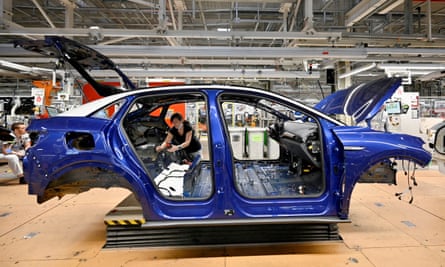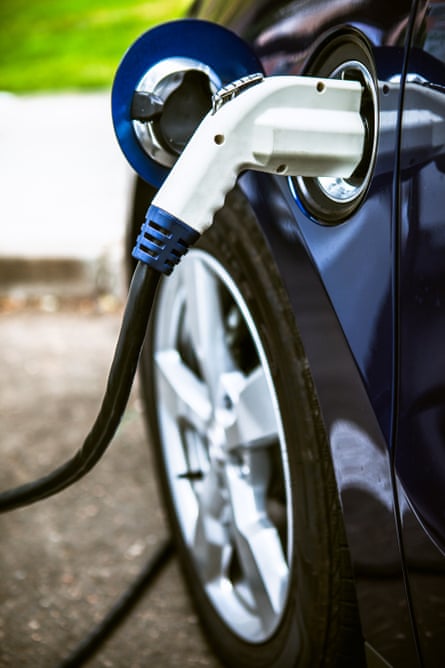There is a spectre haunting electric cars: the question of greenwashing. What if, for all the green hopes attached to zero-emissions cars, the truth is that they fail to achieve their main goal of cutting world-heating carbon emissions?
Our EV mythbusters series has looked at some of the most persistent criticisms of electric cars, ranging from car fires to battery mining, range anxiety to cost concerns. This article asks: do electric cars really produce fewer carbon emissions than petrol or diesel?
The claim
In the US, the Florida senator Rick Scott said there was “ample evidence to suggest that EVs are not as clean as people are being led to believe and folks deserve to know the truth”. He and other Republican colleagues introduced the (suggestively named) “Directing Independent Research To Yield Carbon Assessment Regarding Electric Vehicles (DIRT Y CAR EV) Act”, which tried to call for analysis of the carbon footprint of vehicles.
A recent article in the UK’s Daily Mail reported that “the environmental benefit of electric cars may never be felt” because many electric vehicles “will never hit their mileage target as owners upgrade to newer models, leaving swathes of used electric cars sitting unwanted on garage forecourts”.
But it is not only the rightwing press. In June, the Guardian published an article by the actor Rowan Atkinson in which he said he felt “duped” by EVs’ carbon claims and that the reality was “very different”, citing Volvo research suggesting greenhouse gas emissions during production of an electric car are almost 70% higher than when manufacturing a petrol one.
“It seems a perverse choice of hardware with which to lead the automobile’s fight against the climate crisis,” Atkinson wrote.
The science
Any assessment of carbon emissions associated with a product needs to look at its whole life cycle, from manufacture to scrapping (and, hopefully, recycling). Many claims about electric cars’ supposedly worse environmental toll focus on manufacturing and ignore the actual use of the cars.
The grain of truth in the criticism is that EVs do indeed take significantly more energy to manufacture. Battery production requires large amounts of electricity to heat ovens to bake electrode materials, and to charge and discharge the battery to prepare it for use. While electricity can be produced with zero emissions, most countries still burn carbon-heavy fossil fuels to turn generators. Analysis by the Argonne National Laboratory in Illinois, cited by the US Environmental Protection Agency,suggests that manufacturing battery cars produces about 60% more carbon emissions than their fossil fuel cousins.
That means that electric cars start with a big carbon disadvantage, sometimes described as a “carbon debt”. However, Eoin Devane, a senior analyst for surface transport at the Climate Change Committee, the UK government’s climate science adviser, said: “If you look at the data, that ‘carbon debt’ is paid off within about two years of driving the vehicle.”

The vast majority of fossil fuel cars’ carbon footprint comes in use, when exhaust pipes constantly spew carbon dioxide into the atmosphere. Transport & Environment (T&E), a campaign group, calculates that a new petrol car will produce about 27 tonnes if driven for 100,000 kilometres (62,000 miles), and 49 tonnes over 200,000km.
Electric cars, by contrast, use less energy and can charge from zero-carbon sources. Just how much greener electric cars can be in operation depends on how much renewable electricity is used in local grids. Transport & Environment has a handy online calculator that allows you to play with the grid, choosing between different countries’ energy mixes and whether the battery was made in carbon-heavy China or greener Sweden. Where the lines cross indicates how many miles are needed for a battery car to win on carbon emissions.
Lucien Mathieu, T&E’s cars director, said that even if you choose a worst-case scenario – vehicles made and driven with electricity largely from coal – the electric car will win out after about 70,000km (about six years of driving). “The more you drive an electric car, the better it gets,” he said.
The picture for electric cars will improve as power from the wind and the sun replace gas and oil, reducing carbon emissions from generating electricity. Colin Walker, the head of transport at the Energy and Climate Intelligence Unit thinktank, said: “Even if you have a really dirty grid, EVs are still better for the environment. That will keep going as the grid gets cleaner and cleaner.”
We also need to take into account the future of the technologies. Auke Hoekstra, an energy transition researcher at the Eindhoven University of Technology, said emissions from fossil fuel cars cannot fall much further, meaning they are not a viable technology for a zero-emissions world. Yet battery development is still in relative infancy, and is likely to tip the balance further in favour of electric cars.
Batteries are “a good endgame solution” for the transition to net zero, Hoekstra said. “The gasoline engine is basically going nowhere.”
Any caveats?
Batteries are not the only way to get cars to net zero. You can fill them with “e-fuels” – petrol made with carbon from the air, hydrogen from water, and green electricity. That technology works and will probably be used to power classic cars long into the future. Other people advocate using the hydrogen in fuel cells to run a motor.

However, in either case the energy efficiency is drastically lower than using that electricity directly, and the fuel is likely to be needed for planes, which are much harder to decarbonise.
And there was an important point in Atkinson’s Guardian article: replacing an old, little-used car with a brand new electric car may not make sense because of the “carbon debt”.
“If the vehicle is not being regularly used there is certainly a case to wait until the point you’re going to replace it anyway,” said the CCC’s Devane. However, he and others cautioned that any calculation of relative carbon savings for individuals would be complicated. And, Hoekstra added, “not having an electric car is better for the environment” if you can rely on public transport instead.
The verdict
The scientific consensus is overwhelming: on any realistic like-for-like comparison a battery car will be cleaner than its petrol or diesel equivalent. Burning fossil fuels to make and drive electric cars will still cause emissions, but at a lower level than inefficient fossil fuel engines.
That is true of today’s grid (in richer economies, at least) but in tomorrow’s grid the benefits will grow as long as countries continue to shift away from coal and gas to generate electricity. Putting batteries in cars so far appears to be the only practical way to shift the tens of millions of light vehicles sold every year towards net zero emissions.
"electric" - Google News
December 23, 2023 at 05:00PM
https://ift.tt/kxRI4Ds
Do electric cars really produce fewer carbon emissions than petrol or diesel vehicles? - The Guardian
"electric" - Google News
https://ift.tt/VeTBPbR
https://ift.tt/4g267kW
No comments:
Post a Comment